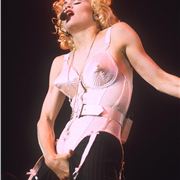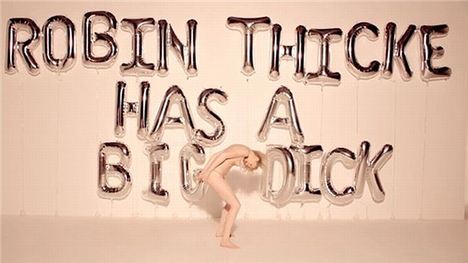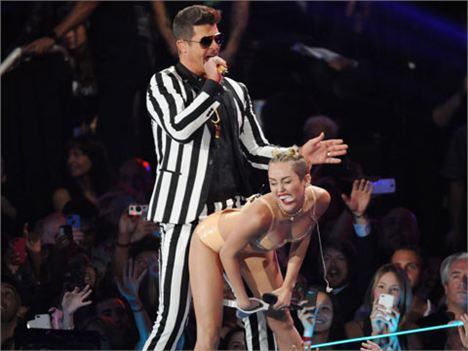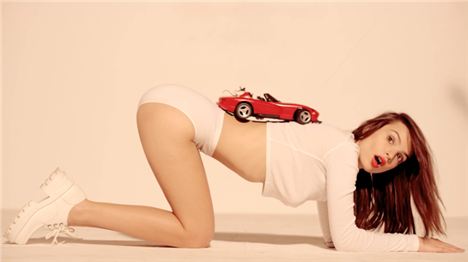IN the midst of recent controversy, when I now think of R&B’s Robin Thicke another ‘type’ of man also comes to mind.
It’s boringly obvious that Robin Thicke is flirting with controversy to raise his public profile. The family man, lily-white image only seems to work for Michael Bublé these days.
He’s a white-collared business man that hits the good bars on weekends. They slip young girls business cards instead of exchanging phone numbers, they pay for drinks while they dangle their American Express card from the tips of their fingers and look you deep in the eye when they tell you to order “anything you like”.
Post Robin Thicke’s number one single ‘Blurred Lines’, featuring Pharrell Williams and rapper T.I, came widespread accusations of the song being degrading to women.
Add to this Thicke’s role in ‘twerk gate’, with barely-out-of-teens Miley Cyrus and the picture of him grappling a fan’s bum, it’s easy to box the 36-year-old suited and booted singer in with the leery, Joop! aftershave wearing, older man category.
Robin Thicke, ‘Blurred Lines’ and the NSFW video that is now banned on YouTube, sparked a debate about the wider problem of misogyny in music and a culture that continually objectifies women.
In a recent move, five universities across the UK have banned the song as a stance against misogyny and it’s further prompted the question as to why some musicians have previously been given a free pass when it comes to any feminism ‘witch hunt’.
On the surface, ‘Blurred Lines’ is a song with all the ingredients for chart-topping success: an infuriatingly catchy and summery-sounding hook, the all important rap cameo appearance, some credible vocal ability and a great big dollop of predictable and gratuitous sex.
That is nothing ground-breaking.
The problem, that has eluded many fans of the song and some of the more liberal press, is the accused undertones of sexual violence.
“It’s kind of rapey” stated journalist Tricia Romano in her article for Daily Beast.
Romano highlighted the songs ‘creepy’ lyrics, in which Thicke speaks of the ‘good girls’ that know they want ‘it’ but are seemingly just too darn shy to get ‘it’. The seedy-sounding repetition of, ‘I know you want it, I hate these blurred lines’ listens, to some, like a sexual deviant who won’t take no for an answer.
Concerned officials at University of Edinburgh believe the song also promotes unhealthy attitudes towards sex and consent.
Kirsty Haigh, EUSA vice president said, "There is a zero tolerance towards sexual harassment, a policy to end lad culture on campus and a safe space policy - all of which this song violates."
Whether the song is as ‘rapey’ as Romano and others suggest, is still very much up for debate.
Earlier this year, rapper Rick Ross ignited a similar fury with his ‘date-rape’ verse on the track ‘UEONO’.
As ‘rapey’ lyrics go, comparatively Ross didn’t just blur lines but crossed them. The acceptance of rape culture in some popular music has become scarily commonplace. Give Eminem’s old albums a re-listen and you’ll know what I mean.
 For argument’s sake, the lyrics in ‘Blurred Lines’ may have been misconstrued by sensitive feminist ears, yet the video isn’t so easy to shrug off.
For argument’s sake, the lyrics in ‘Blurred Lines’ may have been misconstrued by sensitive feminist ears, yet the video isn’t so easy to shrug off.
It’s explicit and NSFW, sure, but the 1990s and Madonna saw that audiences are no longer afraid of a little full frontal action. Instead, what’s hard to ignore, are the three nude models who flit about with youthful jovialness and are played with like props by the fully dressed males. For the most part, it’s Thicke, T.I and Pharell’s decision not to flash some skin too, that has irked most of womanhood, irrespective of feminist values.
“It’s playful”, we’re reassured by the video’s director, Diane Martel. Speaking to Grantland.com she said, “I wanted to deal with the misogynist, funny lyrics in a way where the girls were going to overpower the men.”
She added: “I directed the girls to look into the camera, this is very intentional and they do it most of the time; they are in the power position. I don’t think the video is sexist.”
Regardless of its female director, it’s hard not to feel the video is simply for the male gaze. It is essentially Saturday night ‘on the lash’ lad culture dressed up in an expensive suit.
 Robin Thicke - Blurred Lines video
Robin Thicke - Blurred Lines video
It’s boringly obvious that Robin Thicke is flirting with controversy to raise his public profile. The family man, lily-white image only seems to work for Michael Bublé these days.
Arguably, Robin Thicke’s career, which was in direct competition with another suited R&B crooner, Justin Timberlake, was in need of the PR’s fail-safe career move – negative attention. It sure is working.
In a bid to save face though, Thicke has claimed ‘Blurred Lines’ is a “feminism anthem in itself”. The lyrics ‘he tried to domesticate ya but you’re an animal’ are meant to be seen as liberating and a celebration of “flipping taboos on its head”.
Most would agree that some sexual liberation and a move away from ‘slut-shaming’ is no bad thing. Objectifying women to sell albums, however, certainly is.
Women being objectified in popular culture isn’t anything new. Music genres of all kinds use women as a sort of commodity to sell and we blindly accept and consume.
Big boobs and skimpy clothing are commponplace in an industry that’s less about creativity and more about profit. It forms part of the same marketing plan that has seen Miley Cyrus go from twerking to swinging naked on a wrecking ball of late.
That’s the problem; all integrity in music has started to be watered down to cater to the assumption the audience is incredibly shallow. In particular, the men who listen to popular music such as hip-hop are seen as the most vacuous and shallow of all.
Throw in cars, money, violence and a woman doing ass acrobatics and you’ve got yourself a platinum selling record. Music made by men, for men. Feminists not allowed. It’s all incredibly patronising.
Nonetheless, over the past few months, ‘Blurred Lines’ has penetrated the public sphere in the way only a few songs do. It’s rare that the most popular of pop music brings up social themes. ‘Blurred Lines’ inspired men and women to ask questions about the images we are force-fed daily, got people talking about gender equality and importantly helped us truly define what those lines are.
Follow L'Oreal on Twitter @loreal_B
















